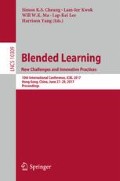Abstract
Blended learning, which combines the advantages of face-to-face learning and online learning, brought new life to the field of education. However, blended learning faces many challenges in junior middle schools. This paper is based on the findings of study on V-China Education Program, which carried out a pioneer initiative program of temporary open online courses for K-12 in China. The team surveyed teachers and students nationwide who joined open online courses provided by the initiative program. The survey shows that there are three types of blending modes based on these open online courses: Pure Online Model, Macro blended Model, Multiparty Collaboration Blended Learning Model. Each mode features different learning and teaching activities. Furthermore, teachers and students experienced with 7 multi-mode courses were surveyed by questionnaires and interviews, and students hold positive attitudes towards blended learning. Besides, high-level experiences such as interactions and experiences of learning-supportive services were required for more successful and more popular blended learning. Based on these findings, the paper put forward a number of suggestions for the implementation of more practices on blended learning in K-12 in China.
Access this chapter
Tax calculation will be finalised at checkout
Purchases are for personal use only
References
Powell, A., Watson, J., Staley, P., et al.: Blending learning: the evolution of online and face-to-face education from 2008–2015. Promising practices in blended and online learning series. Int. Assoc. K-12 Online Learn. (2015)
Means, B., Toyama, Y., Murphy, R., Bakia, M., Jones, K.: Evaluation of evidence-based practices in online learning: a meta-analysis and review of online learning studies. US Dept. Educ. 115(100), 93 (2009)
Cavanaugh, C.S., Barbour, M.K., Clark, T.: Research and practice in K-12 online learning: a review of open access literature. Int. Rev. Res. Open Distance Learn. 10(1), 239–287 (2009)
Mou, Z., Dong, B.: Exploration of blended learning mode based on MOOC——taking coursera platform for example. Mod. Educ. Technol. 24(5), 73–80 (2014)
Zhao, D., Yin, Y.: Study on the teaching practice of blackboard-based B-learning model. Mod. Educ. Technol. 22(9), 41–44 (2012)
Kong, W., Gao, R.: Design and practice of blended learning based on moodle. China Educ. Technol. 2, 80–83 (2008)
Jiang, L., Huang, L., Zhang, D.: Research on the application of blended learning platform based in windows live groups. China Educ. Technol. 10, 136–140 (2012)
Yuan, L., Chen, X., Zhang, Y.: A study of blended learning supported by WeChat– basic photography technology as an example. China Educ. Technol. 7, 128–132 (2012)
Huang, L., Yang, J., Li, W.: Construction of blended learning model based on free web service——take modern educational technology as an example. E-education Res. 8, 103–108 (2011)
Zhao, Y.: Study on the effect of blended curriculum design and development in secondary vocational education. E-education Res. 5, 91–96 (2014)
Wang, Z., Zhang, S.: Research and practice of blended learning in liberal arts curriculum in universities– a case study of visual culture and media literacy. E-education Res. 10, 37–41 (2010)
Li, S., Hu, J.: Exploration and practice of the blended models of MOOC based on information technology. Comput. Knowl. Technol. 12(27) 2016
Gong, L.: Research of blending learning mode based on flipped class ——taking financial accounting: course comprehensive training as an example. J. Jincheng Inst. Technol. (6) (2016)
Zhao, G., Yuan, S.: Factors affecting students’ satisfaction in blended learning: the case of peking university. Distance Educ. China 6, 32–38 (2010)
Ma, W., Zhang, X.: Research and practice on college english blended learning model. Comput. Assist. Foreign Lang. Educ. 3, 50–57 (2011)
Jin, Y., Wang, Y., Liu, J.: Hierarchical instructional design and its practice based on the blended learning theory. Mod. Educ. Technol. 23(1), 37–40 (2013)
Acknowledgments
This work is supported by online education fund from MOE Research Center for Online Education (QTONE EDUCATION grant NO. 2017ZD103).
Author information
Authors and Affiliations
Corresponding author
Editor information
Editors and Affiliations
Rights and permissions
Copyright information
© 2017 Springer International Publishing AG
About this paper
Cite this paper
Li, Y., Wu, M., Dai, J., Chen, S. (2017). The Findings of Multi-mode Blended Learning in K-12: A Case Study of V-China Education Program. In: Cheung, S., Kwok, Lf., Ma, W., Lee, LK., Yang, H. (eds) Blended Learning. New Challenges and Innovative Practices. ICBL 2017. Lecture Notes in Computer Science(), vol 10309. Springer, Cham. https://doi.org/10.1007/978-3-319-59360-9_8
Download citation
DOI: https://doi.org/10.1007/978-3-319-59360-9_8
Published:
Publisher Name: Springer, Cham
Print ISBN: 978-3-319-59359-3
Online ISBN: 978-3-319-59360-9
eBook Packages: Computer ScienceComputer Science (R0)

